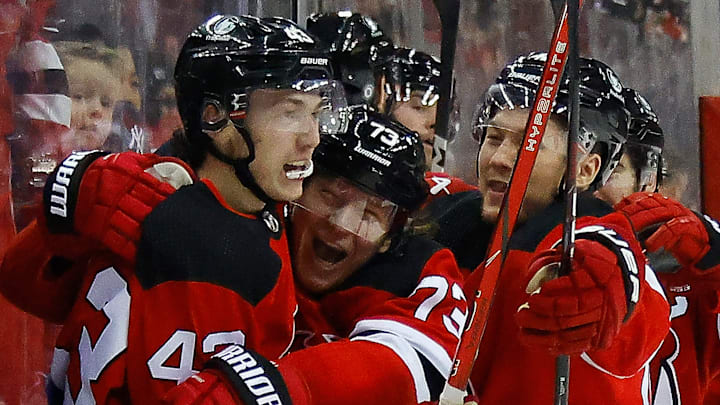The New Jersey Devils came into the season with pretty clear aspirations. They wanted to make the playoffs and go far. They invested big contracts in Jesper Bratt and Timo Meier, along with adding Tyler Toffoli and Colin Miller from outside the organization. We knew the Devils were spending big, especially compared to previous seasons. They were a salary cap team now, as they assumed this was the era of winning.
Then, this season happened. Jack Hughes has been injured for weeks. So has Timo Meier, although he has recently returned. Dougie Hamilton is out for probably the season. Listen, we don't need to do this again. Everyone has been or is injured. Even with a healthy lineup, this team can't win consistently. They have three wins in the past 10 games.
Despite the struggles, the Devils are five points out of a playoff spot with three games in hand of the Philadelphia Flyers. The playoffs aren't out of the question. One two-week win streak would put the Devils in the postseason. The Metropolitan Division has been big bad over the past month. Looking at every team in the division, only the Carolina Hurricanes have won more than they lost in their last 10 games.
Of course, the Devils want to make the playoffs. However, the lack of a trade to this point despite serious needs at goalie and defenseman, plus the loss of Michael McLeod at center, has some wondering if the Devils are all in on making the playoffs.
Well, there is one thing to consider when seeing if the Devils should make a trade this season. The Devils are already invested heavily in winning this season. Despite playing under an $83.5 million salary cap, the Devils are currently spending $98.43 million on salaries this season. The discrepancy comes from major salary years for Meier ($12 million this season), Jesper Bratt ($10 million), Ondrej Palat ($6.9 million), Erik Haula ($3.9 million), Dougie Hamilton ($12.6 million), and Vitek Vanecek ($3.75 million).
The NHL's Collective Bargaining Agreement says that a player's salary cap comes from 50% of league revenues predicted for the next year. One could assume the Devils are expected to make $83.5 million in profits this season. However, they took around $15 million from that off the bat with extra money on player contracts. Of course, that will come with savings down the line, but teams aren't in the business of losing money in the short term.
The Devils likely assumed they could make money back on playoff gates. The NHL allows teams to keep 65% of the gate in the playoffs, which is why most teams hike ticket prices. Last season, the New York Post reported that the cheapest tickets you could get on the secondary market were north of $200. We just checked, and for the Devils next home game against the Colorado Avalanche, you can get tickets for as little as $20.
It's no surprise that playoff tickets can be double, triple, even quintuple the price of regular season prices depending on the demand. Teams use this to make the different between profit and no profit. The Devils may be in that position. They are spending like they never have before, and their ticket sales haven't been as good as last season because of how frustrating the on-ice product has been.
The Devils also know if they just sit on their hands over the next few weeks, the fans might do the same, impacting profits even more. After announcing an extension for Tom Fitzgerald, we assume these conversations have happened. The Devils aren't just owned by one owner looking to win like the New York Mets. They are basically owned by an investment firm. That's how you get Will Smith and Michael Rubin as an owner without them even knowing.
The key to the Devils is a business that makes money. They went on a spending spree that came to roost this season. The Devils thought with a massive increase in season ticket sales, extra concessions, jersey sales, etc. the increased costs would be counteracted by increased profits. The Devils likely need the playoffs to actually make the money they expected this season, and that could impact their Trade Deadline strategy.
